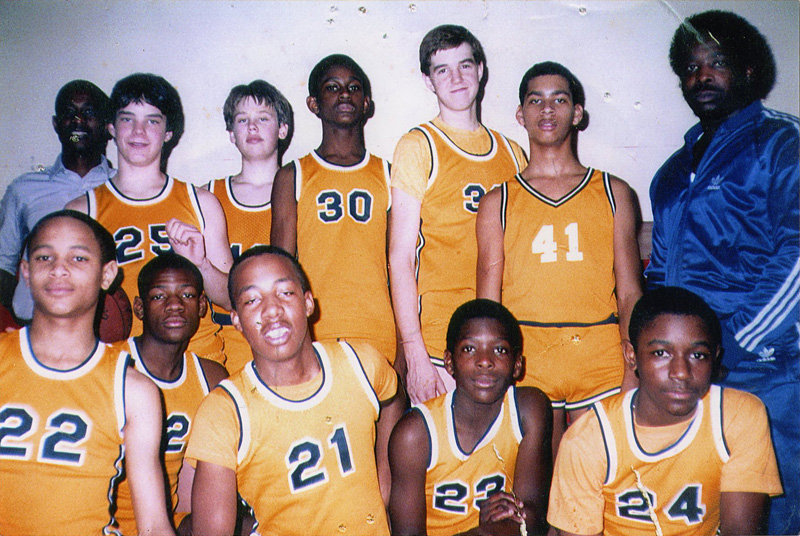As a kid in the ’80s, growing up in the homogenous, white suburbs north of Seattle, Doug Merlino writes, “Occasionally I rode through the Central Area along 23rd with my parents. We kept the windows rolled up and the doors locked.” But in 1986, this eighth-grader gained a very different view of south Seattle—via basketball, as he relates in The Hustle: One Team and Ten Lives in Black and White (Bloomsbury, $26).
Merlino and a handful of other boys at Lakeside Middle School joined an integrated squad with Central Area kids, coached by an African American and organized by a wealthy, well-meaning Lakeside parent. Before then, Merlino says by phone, he had never considered his little bubble of privilege: “I grew up in the Richmond Beach area, which was pretty much all white. That was a kind of hermetic world. As kids, you didn’t know any better.”
Unsurprisingly, the players of both races weren’t eager to talk about color lines and Seattle’s history of polite segregation (achieved mainly by zoning, redlining, and resistance to busing). “The subject was not generally discussed,” remembers Merlino. “I think there was a sense of ‘Let’s not talk about that. Let’s play and be friends.’ Sports gives you that feeling of equality on the court.”
Indeed, driving around in a battered old Dodge van to games, or practicing in the gym, the kids traded gags, insults, Run-D.M.C. lyrics, and coveted Air Jordan sneakers—which, Merlino writes, he owned but was too embarrassed to wear. They were the innocent, unwitting subjects in a social-engineering experiment, as Merlino the benchwarmer—”I’m here for racial balance”—would later recognize.
Their patron, Randy Finley, founder of the Seven Gables theater chain, wanted to expose his son and the other Lakeside boys to life outside their cloistered campus. Their coach, Willie McClain, wanted to provide his son and other South End kids the chance to network and possibly gain academic scholarships at Lakeside or Seattle Prep, then go on to college.
The Finley-McClain experiment both did and didn’t work according to plan. And it took journalist Merlino, who once interned at Seattle Weekly, almost 20 years to learn what became of his teammates. For vague reasons, Merlino left Lakeside (and basketball) after ninth grade, finished high school in Edmonds, and lost touch with teammates both black and white. Then, in a shock that would later cause him to start researching the book, Merlino read in 1991 that ex-teammate Tyrell Johnson had been murdered and dismembered near Rainier Beach. (Part of The Hustle investigates that crime.)
Living today in New York, Merlino explains of his follow-up interviews, “Having not gone through high school with all the Lakeside guys, I was coming in fresh to both sides. It kind of put me in the middle of both these groups. Of course I knew that Tyrell was dead. Otherwise I came back with a blank slate.”
In structure, The Hustle somewhat resembles the great documentary series Seven Up, which provides now-and-then profiles of kids shaped by the English class system. Only here, both race and class come into play. Merlino adds to his memoir a fair amount of sociological context and local history—from white flight and busing to neighborhood schools and the WASL. This background will be more useful for readers outside Seattle; short sections on globalization, the dot-com boom, and Kurt Cobain’s significance also feel like padding.
Most interesting and affecting about the book are Merlino’s conversations with former teammates—resumed, as it were, after a 15-year gap. “When you’re 30,” he says, “you can start talking about this stuff.” And these adult subjects are candid and thoughtful in response to his earnest inquiries. We meet a drug felon in jail, a King County prosecutor, prosperous businessmen, a shy winemaker, and a churchgoing family man who teaches at Zion Preparatory Academy. (Several will appear with Merlino at Wednesday’s panel discussion.)
Today, the black players grown into parents must struggle with what Merlino calls in The Hustle “a choice between racial solidarity and the potential for class mobility.” One of the few black kids who graduated from Lakeside sheepishly tells Merlino of his kids, “I would probably send them to private school.” And he calls public schools “a mess.”
Meanwhile, the grown white players from the old team confront such issues—e.g., Bush versus Garfield—without worrying about the loss of culture. They’re the sort of well-to-do liberals who vote for school levies but put their kids in private schools.
When Merlino reunites these two groups to play basketball, one of the South End players sadly reflects on the murdered Johnson. “It could have been any one of us,” he says in The Hustle. Merlino is too generous and well-intentioned to correct him: Any one of us means any one of you.








